Conquer night sweats with confidence. Discover triggers and practical solutions for peaceful, uninterrupted sleep in our comprehensive guide.
Table of Contents
Introduction – Night Sweats
Night sweats refer to excessive sweating during sleep and can significantly impact an individual’s quality of life. They are often associated with an individual’s sleep environment or can indicate underlying health issues. Managing night sweats typically begins with lifestyle adjustments, such as optimizing the bedroom temperature and choosing moisture-wicking bedding, but when these are insufficient, further investigation into their cause is required.
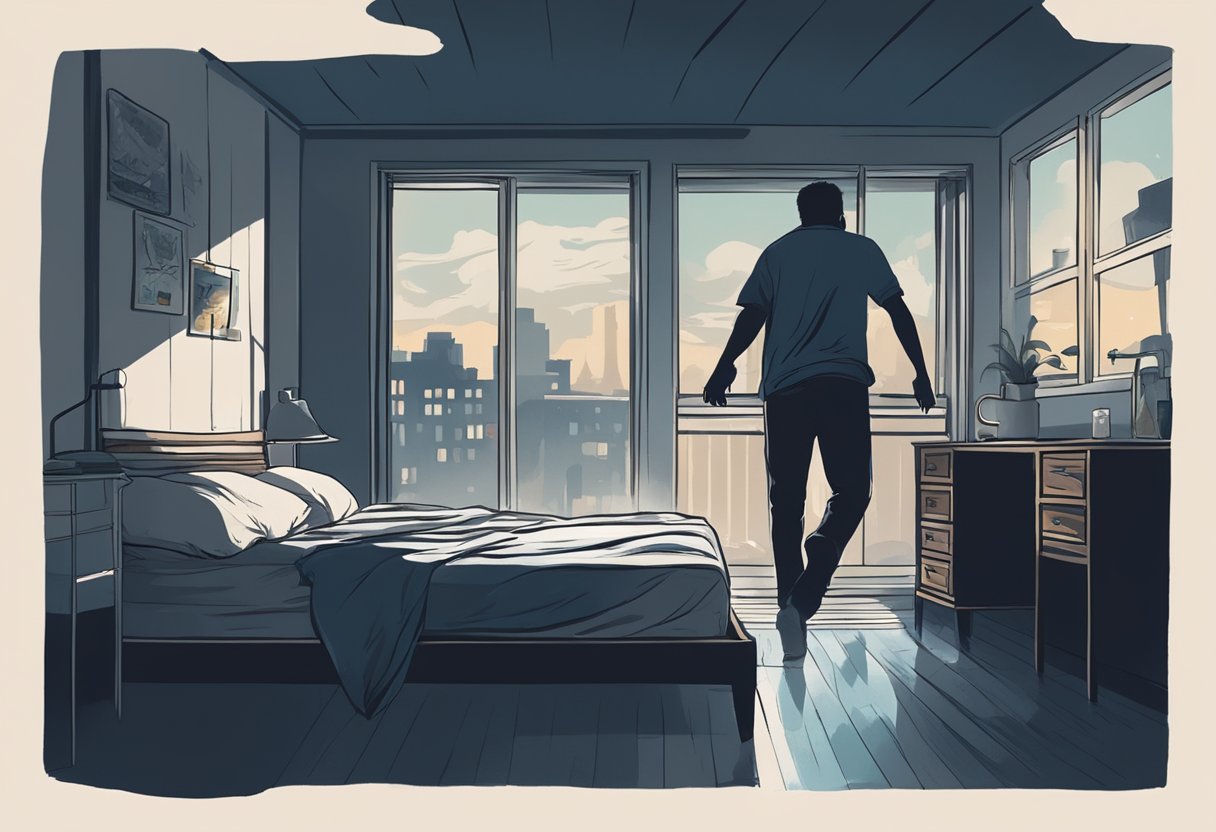
Understanding the potential reasons behind night sweats is crucial for proper management and treatment. They can be symptomatic of a variety of conditions, from menopausal hormonal changes to infections and other more serious illnesses. Accurate diagnosis often necessitates a comprehensive evaluation, which includes a review of symptoms, medical history, and potentially laboratory tests. Once an underlying cause is determined, targeted treatments can be quite effective.
Coping with night sweats involves dealing with the discomfort they cause and addressing their root cause. When lifestyle changes are not enough, seeking professional medical advice is essential. A healthcare provider can offer guidance on treatment options and help manage any associated health conditions.
Key Takeaways
- Night sweats can disrupt sleep and may signal underlying health issues.
- Accurate diagnosis of night sweats requires evaluating a range of potential causes.
- Professional medical advice should be sought when lifestyle changes do not alleviate symptoms.
Understanding Night Sweats
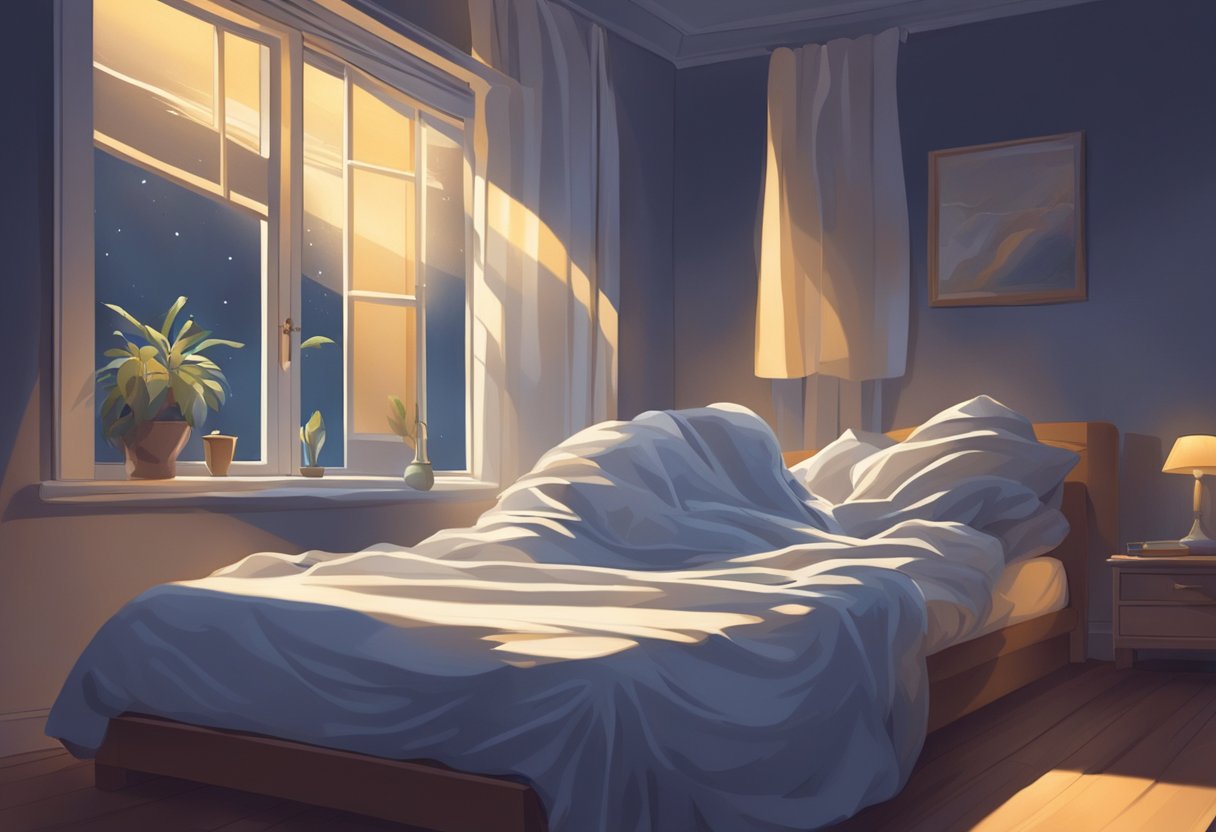
Night sweats are episodes of excessive sweating during sleep that can be disruptive and concerning. They may indicate underlying health conditions or be triggered by environmental factors.
Causes and Triggers
Factors that trigger night sweats include menopausal changes in women, fluctuations in temperature, certain infections, cancer, alcohol use, specific drugs, anxiety disorders, and fever. For instance, women going through menopause often experience hot flashes that lead to night sweats. In addition, conditions like HIV and lymphoma are commonly associated with night sweats due to their impact on the body’s immune and lymphatic systems, respectively.
Key triggers and associations include:
- Menopausal changes in women
- Certain infections lead to fever
- Cancers, particularly lymphoma
- Substance use, including alcohol and drugs
- Anxiety and stress-related disorders
Physiology of Sweating
Sweating helps regulate the body’s temperature. During night sweats, various conditions might affect the body’s thermoregulatory control, leading to increased sweat production. Hormonal imbalances, which are common during menopause or reactions to medications, can disrupt the body’s normal temperature control mechanisms.
Physiological factors involved:
- Temperature regulation disruptions
- Hormonal imbalances, particularly in menopausal women
- Drug-induced thermoregulatory changes
| Key Findings | Related Keywords and Entities |
|---|---|
| Menopause often leads to night sweats due to hormonal changes | Menopause, hormones, temperature |
| Infections and fever can trigger increased sweating at night | Infection, fever, immune response |
| Night sweats can be a symptom of certain cancers, like lymphoma | Cancer, lymphoma, night sweats |
| Substance use, especially alcohol, can disrupt sleep and cause night sweats | Alcohol, substance use, sleep disruption |
| Anxiety disorders are known to trigger night sweats | Anxiety, stress, sweating |
Relevant sources and evidence:
- Mayo Clinic: Causes and Triggers
- Sleep Foundation: Physiology of Sweating
- Healthline: The Link between Menopause, Cancer, and Night Sweats
- Verywell Health: Night Sweats in Diseases
Health Conditions Linked to Night Sweats
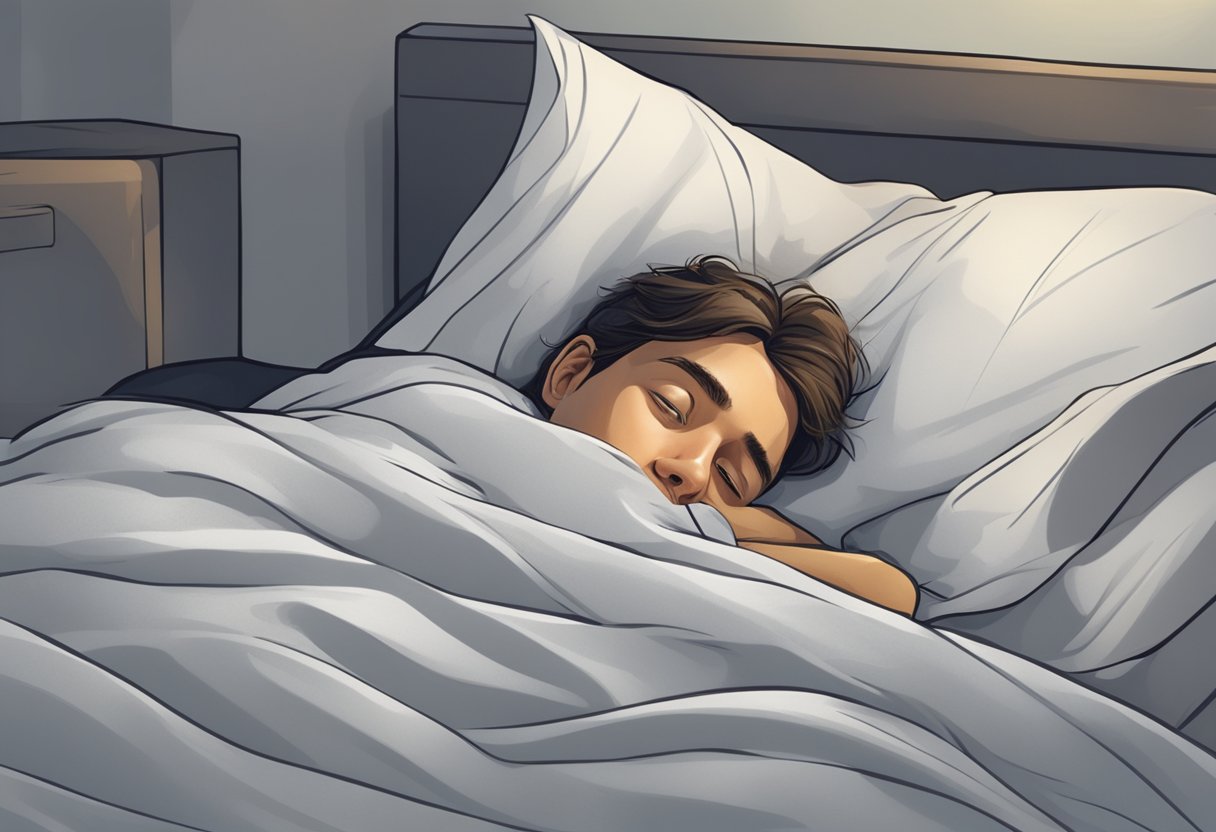
Night sweats can be a symptom of various underlying health issues, ranging from infections to hormonal imbalances. They are often an indicator that the body is trying to fight off a condition or is experiencing significant changes.
Infections and Fevers
Infections, such as tuberculosis or endocarditis, can cause the body to sweat excessively at night as it tries to combat the illness. Fevers commonly induce night sweats due to the body’s natural temperature regulation response.
Hormonal Changes
Hormonal shifts, which can occur during pregnancy, perimenopause, and changes in testosterone levels, are a common cause of night sweats. These sweats result from the body’s thermoregulatory center responding to hormone fluctuations.
Cancer and Hematologic Conditions
Certain types of cancer, including leukemia, can present night sweats as a symptom. It is crucial to note that night sweats alone are not a diagnosis of cancer but can accompany it.
Endocrine and Metabolic Disorders
Endocrine disorders such as hyperthyroidism and diabetes, which affect metabolic rate and blood sugar levels, can result in excessive sweating at night. Specifically, low blood sugar can trigger the body to sweat during sleep.
Other Health Issues
Conditions such as sleep apnea, hyperhidrosis, and autonomic neuropathy, or the use of medications like steroids, can all lead to night sweats. Additionally, a person experiencing high levels of stress or anxiety might also experience this symptom.
| Condition | Link |
|---|---|
| Tuberculosis | Mayo Clinic |
| Endocrine Disorders | Healthline |
| Cancer | Verywell Health |
| Hormonal Changes | Sleep Foundation |
Diagnosis and Evaluation
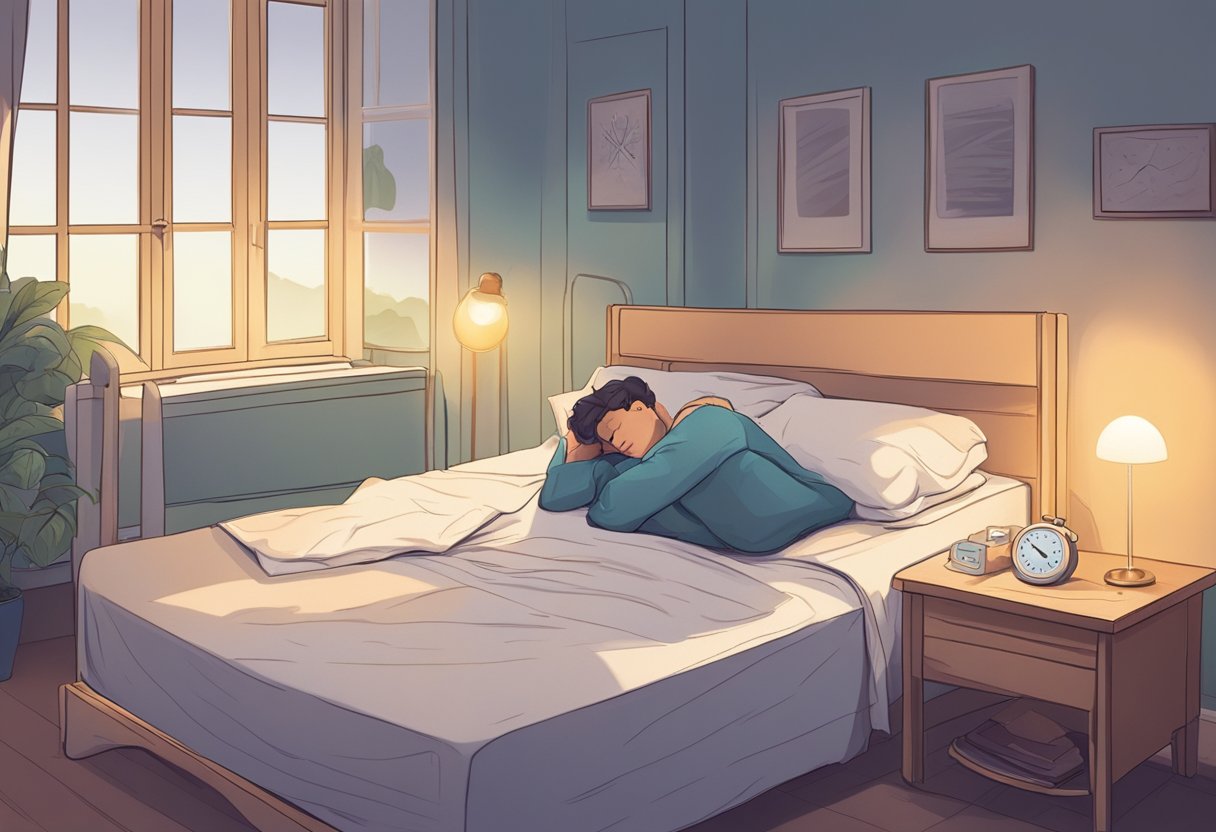
To determine the cause of night sweats, a healthcare provider will typically conduct a thorough evaluation, including a detailed medical history, a physical examination, and possibly a range of laboratory tests and imaging studies. This approach helps identify or rule out various medical conditions that manifest as night sweats.
Medical History and Physical Examination
The first step in evaluating night sweats involves gathering a patient’s medical history and performing a physical examination. The doctor needs to understand the pattern and severity of the night sweats. The patient may be asked about other symptoms, such as fever, unexplained weight loss, or swollen lymph nodes, which could indicate a serious underlying condition. Examination of the lymph nodes and other body areas can offer critical clues to the physician.
Laboratory Tests and Imaging
The doctor may order laboratory tests and imaging studies following the initial assessment. Common laboratory tests include blood count and thyroid function tests, which can reveal potential issues like hyperthyroidism or infection. Imaging such as computed tomography (CT) may be recommended if the doctor suspects specific conditions like lymphoma or other malignancies.
| Key Findings | Relevant Keywords and Entities |
|---|---|
| Detailed medical history and examination | Doctor, evaluation, night sweats |
| Blood tests to assess complete blood count, thyroid function, etc. | laboratory tests, medical issue |
| CT imaging for suspected malignancies | imaging studies, serious symptom |
| Sources | URL |
|---|---|
| American Academy of Family Physicians: Persistent Night Sweats | aafp.org |
| Evaluation of the patient with night sweats | uptodate.com |
| Causes of night sweats | mayoclinic.org |
| Night Sweats Diagnostic Evaluation | pubmed.ncbi.nlm.nih.gov |
Management and Treatment
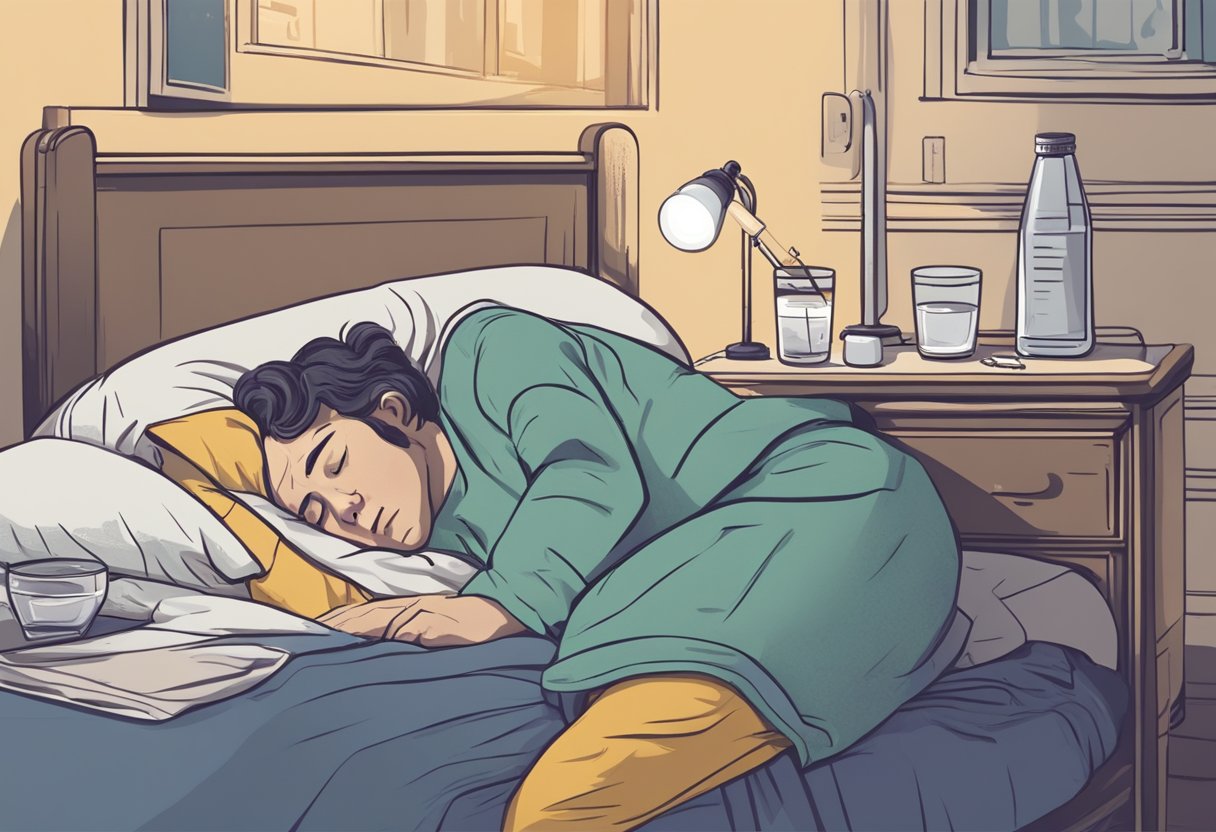
Managing night sweats involves a combination of lifestyle adjustments and medical treatment options. These strategies aim to minimise discomfort and address any underlying health issues contributing to night sweats.
Lifestyle and Environmental Factors
Individuals can modify their sleeping environment and adopt certain lifestyle changes to alleviate symptoms. Suggestions include:
- Utilizing breathable bedding and sleepwear made from natural fibers.
- Maintaining a cool room temperature and using fans or cooling devices.
- Avoiding known triggers such as spicy foods, caffeinated beverages, nicotine, and alcohol before bedtime.
Medical Treatment Options
If lifestyle adjustments do not adequately control night sweats, individuals should consult a healthcare provider to explore medical treatments. Treatment plans may include:
- Hormone therapy for menopause-related night sweats, with careful consideration of individual risk factors.
- Prescription medications: Some drugs, such as antidepressants or antihypertensive agents, may help in reducing night sweats.
- Addressing underlying conditions such as infections, hormone imbalances, or cancers with appropriate medicine.
| Key Concept | Description | Source |
|---|---|---|
| Lifestyle Changes | Advised for initial management of night sweats, focusing on cool environments and avoiding triggers. | Sleep Foundation |
| Medical Treatments | Includes hormone therapy and medications specifically aimed at treating the underlying causes of night sweats. | Healthline |
| Hormone Therapy | Often prescribed for menopausal women, with individualized treatment plans. | Cleveland Clinic |
By diligently applying a combination of lifestyle modifications and seeking medical advice when necessary, managing night sweats can become a more manageable part of routine health care.
Coping with Night Sweats
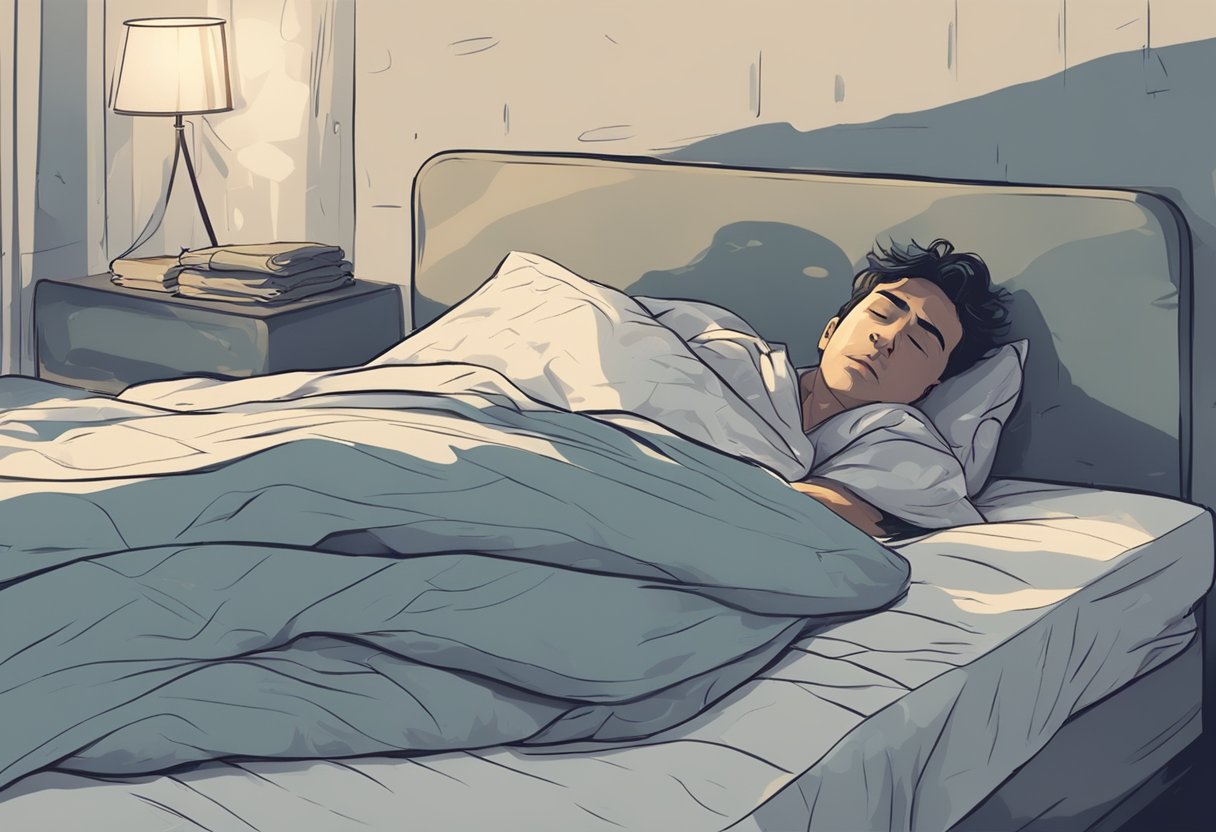
Effective management of night sweats involves creating an optimal sleep environment and selecting appropriate clothing and bedding materials. The goal is to regulate your body temperature and ensure sleep comfort.
Bedroom Environment
To maintain a cool and comfortable sleep area, one can adjust the thermostat to a lower setting, ideally between 60-67 degrees Fahrenheit. A cooler room helps prevent the body from overheating. Investing in a breathable mattress and lightweight sheets can facilitate better air circulation. Consider materials like cotton or moisture-wicking fabrics.
Clothing and Bedding Solutions
Wearing loose-fitting, moisture-wicking pajamas can aid in reducing sweat absorption and thermal discomfort. When selecting blankets, one should opt for lighter, breathable materials rather than heavy, insulating ones. One’s bedding choices should be aimed at moisture management and temperature regulation to prevent nighttime sweating episodes.
| Key Strategy | Description | Source URL |
|---|---|---|
| Thermostat Setting | Keep the room between 60-67 degrees Fahrenheit | Night Sweats: Causes and Tips |
| Breathable Bedding | Use moisture-wicking and breathable fabrics for sheets and blankets | How to Deal With Night Sweats |
| Entity | Finding |
|---|---|
| Pajamas | Opt for moisture-wicking materials |
| Blankets | Choose lightweight, breathable fabrics |
| Mattress | Should ensure adequate air flow |
| Thermostat | Set to a cool temperature |
When to Consult a Healthcare Professional
When experiencing night sweats, it can be challenging to determine when to seek medical advice. Night sweats are repeated episodes of excessive sweating that may soak nightwear or bedding and are often related to an underlying medical condition or illness. They should be discussed with a healthcare professional if they:
- Occur on a regular basis and interrupt sleep.
- Are paired with other symptoms like high fever, weight loss, pain, cough, or diarrhea.
- Persist or start long after menopause symptoms have ceased.
Excessive sweating at night that coincides with fevers can indicate infections or other health issues requiring medical evaluation. Additionally, individuals with obstructive sleep apnea may experience night sweats and should consider an evaluation for this condition.
Stress can also be a trigger for night sweats, and discussing stress management techniques with a physician may be beneficial. If significant lifestyle disruption is noted or if night sweats occur alongside unexplained symptoms, it’s crucial to consult with a doctor. It’s important for the evaluation to rule out any serious underlying medical conditions.
Listed below is a table with key points to remember when considering whether to see a healthcare professional, along with relevant sources:
| Key Point | Related Information | Source |
|---|---|---|
| Regular Episodes | Consistent occurrences need evaluation | Mayo Clinic |
| Accompanying Symptoms | High fever, weight loss, or other concerning symptoms | Healthgrades |
| Menopause Consideration | Start after menopause ended | Mayo Clinic |
| Sleep Apnea Connection | Consider if accompanied by obstructive sleep apnea | Apria |
| Lifestyle Disruption | Impact on daily routine warrants a visit to the doctor | Texas Health Resources |
Frequently Asked Questions
This section addresses some common inquiries about night sweats and provides insights into their potential causes and management strategies.
What underlying conditions can lead to night sweats in both men and women?
Night sweats in both men and women can often be associated with various health conditions. These include hormonal imbalances, such as those occurring during menopause, as well as infections, autoimmune disorders, and conditions like hyperthyroidism. Night sweats are also a known symptom of some forms of cancer and can be a side effect of certain medications. For more detailed information, the Mayo Clinic offers a comprehensive list of conditions that can cause night sweats.
What are the possible reasons for waking up in the middle of the night soaked in sweat?
Waking up drenched could be due to environmental factors like a hot bedroom, but medical reasons such as infections, sleep apnea, or even stress and anxiety can contribute. The Sleep Foundation explains that less frequently, it could suggest a serious medical issue, therefore, evaluating recurring incidents with a healthcare provider is advisable.
Are there effective methods to prevent or reduce night sweats?
There are several strategies that may help manage or prevent night sweats. Simple measures include keeping the room cool, using lightweight bedding, and wearing breathable clothing to bed. Additionally, addressing triggers such as spicy food or alcohol before bedtime can be beneficial. Interventions like hormone therapy or changes in medication may be necessary, as discussed by Verywell Health.
At what point should one become concerned about experiencing night sweats?
Concern should arise when night sweats are frequent, persistent, and cannot be attributed to environmental factors or easily explainable causes. They should be especially concerning if accompanied by other symptoms like unexplained weight loss or fever. The Cleveland Clinic recommends seeking a healthcare provider’s assessment when night sweats are paired with these additional signs.
What medical explanations exist for night sweats without the presence of a fever?
Night sweats without a fever can be linked to a range of non-infectious causes like anxiety disorders, autoimmune diseases, and certain medications. Moreover, hormonal changes that do not cause fever can result in night sweats. For an in-depth understanding, readers can refer to the resources provided by Verywell Health.
Which parts of the body are most commonly affected by night sweats in females?
The most commonly affected areas by night sweats in females include the neck, chest, back, and to some extent the limbs. These areas tend to be more prone to profuse sweating in general. Notably, during menopause, these areas may be particularly affected due to hormonal fluctuations, as mentioned by healthcare providers and outlined by the Mayo Clinic.




